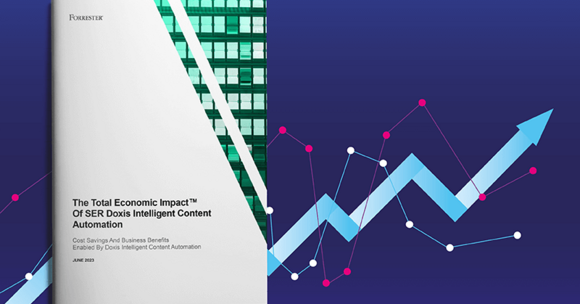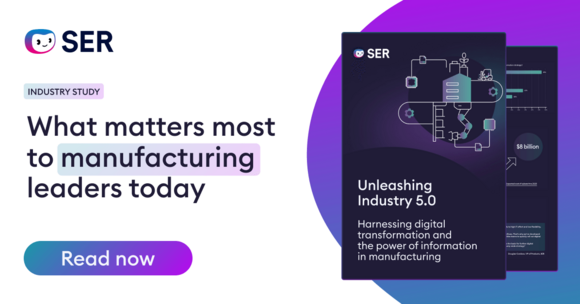SER Blog Customer Stories & Use Cases
How manufacturers are tackling these 5 challenges with digital transformation
Stringent requirements for sustainability, new types of global competition, and unstable supply chains are just a few of the tough challenges that manufacturers face today. To be more resilient to these challenges and future-ready, manufacturers need to level up their innovativeness and more effectively harness digital solutions, essentially, as advisory firm Forrester Research says, “shifting from grease to code.”¹

A shortage of skilled workers, stringent laws and regulations for sustainability, unstable supply chains, or new types of global competition – the list of issues that businesses in the manufacturing industry have to deal with is long. Individual challenges can amplify each other, such as establishing new supply chain networks: Global crises such as the Covid-19 pandemic have, in some cases, completely dismantled global supply chains and, in light of demanding sustainability regulations such as the proposed EU Supply Chain Act, make it especially challenging to rebuild supply chains.
Digital transformation is playing a key role in overcoming many of these challenges. Gartner analysts believe that technology will redefine the value of a manufacturing business in the future.² It’s no surprise that companies worldwide are investing more than 1.1 billion euros in digital transformation solutions every year, according to a survey by PWC from 2022.³

Shortage of skilled workers
The Great Resignation has left its mark in nearly every industry, and the manufacturing sector is no exception. As a matter of fact, Gartner sees the high cost and shortage of skilled workers as one of the top three challenges in the manufacturing sector. Almost all subsectors of manufacturing report unfilled positions, which has placed the burden of additional workloads on remaining teams.
There is a path forward though: State-of-the-art digital transformation measures such as enterprise content management (ECM) software can simplify and speed up daily work for teams*, for example, through intelligent information management and process automation. HR departments, for instance, benefit from automated and lean recruiting processes, which improves applicant experience. Legal departments also benefit from an ECM system in which the entire contract lifecycle is streamlined through integrated workflows which free up legal professionals for more value-added work.
Increasing global competition
Manufacturing firms face increasing financial pressure due to new competitive policies, such as decoupling, a process by which national markets decouple from the global economy. The result: increasing import and export bans on individual raw materials and products, additional regulatory requirements for these markets, and further disruption to international supply chains. Businesses are dependent on building new supplier networks to replace raw materials or intermediate products that are no longer available.
With the right digitalization tools in place, manufacturing firms are much more resilient to dynamic and even volatile market conditions. Digital solutions can provide better visibility of supplier relationships and KPIs, enabling them to respond early to competition, instability and risk. This positively impacts financials as well, as a McKinsey report states: "Better monitoring of supplier KPIs due to the deployment of a mobile digital solution that gave real-time feedback on supplier performance reduced value leakage by up to 5 percent simply due to improved performance discussions with suppliers."
Unstable supply chains
Due to a lack of raw materials and precursor products from abroad, many domestic markets are struggling. The German industry, for example, lost out on some 64 billion euros worth of goods production between April 2021 and mid-2022.4 To create more resilient supply chains, it’s crucial that manufacturers establish a single source of truth that incorporates data and information along the entire supply chain and provides it to purchasing, sales, finance, product development, R&D, and operations. This vastly improves the decision-making ability and agility of business leaders. If there are delays in delivery or discrepancies in scope, information is provided clearly, immediately and automatically. Production and procurement can respond immediately and, if necessary, give the order to another supplier. The prerequisite for this is a state-of-the-art supplier management process.
Stricter laws and regulations tie up resources
Companies in the EU face numerous legal requirements and regulations, such as the EU Corporate Sustainability Reporting Directive (CSRD) or the proposed EU Supply Chain Act. The expansion of reporting obligations means companies will have to submit retroactive and forward-looking quantitative and qualitative data from all areas related to sustainability, which has the potential to tie up significant financial and human resources. Manufacturers will have a much easier time complying with reporting obligations if they have a centralized, end-to-end information management system in place, which creates the basis for the required transparency.
What matters to manufacturing leaders today
Our international survey revealed:
- The 5 biggest challenges in the industry
- The 6 most important trends you should't miss
- The 3 most promising digital transformation projects in 2024

Focus on sustainability
Expectations regarding sustainability are high for the manufacturing industry, and include climate-neutral production, a secure supply of energy from renewable sources, and the establishment of a supplier network that meets stringent standards of human rights and environmental conservation. For manufacturing firms to demonstrate the fulfillment of these requirements, they will need to free up resources and ensure that they have the right digital solutions in place to streamline the process. By creating a single source of truth, in which information on suppliers, customers and all lines of business are intelligently and centrally managed and automated, industrial firms are able to ensure better monitoring of compliance with sustainability standards.
Digital kingpins: Taking the lead in digitalization
To meet these myriad challenges, industrial companies worldwide are investing over a trillion euros in digital solutions. An estimated 64% of the companies are only at the beginning of their digitalization efforts. Their goals are to bring greater flexibility and resilience to production processes and at the same time reduce costs. According to a PWC study5, "digital champions" often achieve double-digit returns through the one-two punch of cost efficiency and greater flexibility.
One example of how a company can benefit from digitalization is Eissmann Group Automotive. The firm has digitally integrated more than 1,000 suppliers into its production system via a centralized ECM solution that provides a true 360° view of its suppliers and its perfectly aligned, enterprise-wide processes. This saves not only costs and time. Because the many different stakeholders in the supply chain work together easily and share information without a hitch, they have a better understanding and awareness of sustainability aspects throughout the supply chain.
What's next: Digital trends in the manufacturing industry
Those who manage their information and processes efficiently and streamline their business operations create the conditions for successful digital transformation. And these are the ones who will be the winners in head-to-head global competition. In our next blog post, we share with you the digital trends that businesses in the manufacturing industry are harnessing – and the benefits they can expect to gain.
How SEW-EURODRIVE achieved an ROI of 336%
Forrester Consulting studied the total economic impact of Doxis Intelligent Content Automation at our customer SEW-EURODRIVE.
Discover the significant findings of this independent study.
Download the study
(1) Forrester Trends Report, The Future Of Manufacturing, September 2022
(2) Gartner, Manufacturing Digital Transformation and Innovation Primer for 2023, February 2023
(3) PWC, Digital Factory Transformation Survey 2022, June 2022.
(4) Institut für Makroökonomie und Konjunkturforschung (IMK), Materialengpässe setzen deutsche Automobilproduktion massiv zu, November 2022
(5) PWC, Digital Factory Transformation Survey 2022, June 2022
The latest digitization trends, laws and guidelines, and helpful tips straight to your inbox: Subscribe to our newsletter.
How can we help you?
+49 (0) 30 498582-0Your message has reached us!
We appreciate your interest and will get back to you shortly.




